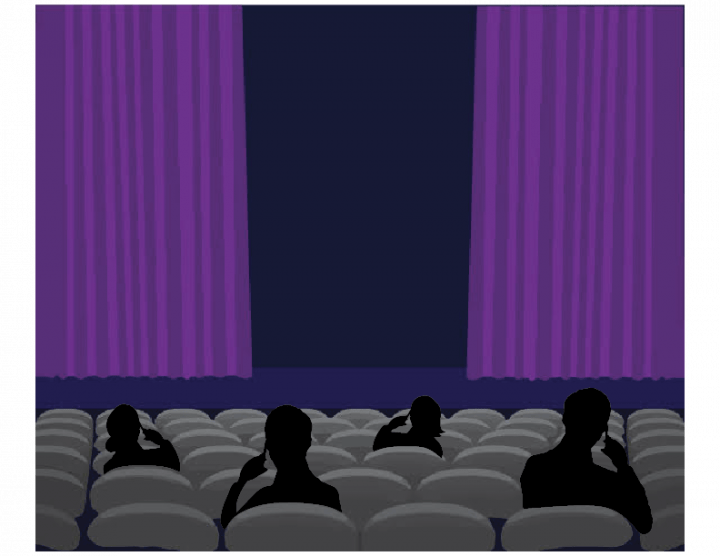
As a high school student, I remember asking my friends if they’d be interested in coming with me to various classical music concerts. We’d dress nicely — not too nicely, of course — and sit in the faraway student-ticket sections of incredibly high-end concert venues. We’d turn off our cell phones and disconnect from our Internet-based high school lives. It was the only occasion in which we would choose to forget about social media and virtual interaction for hours at a time.
Back then, in the era before digital wellness became technology companies’ newest selling point, I wasn’t as conscious of the battle between the performing arts and the cell phone. I had witnessed the occasional pre-concert reminder to turn off my cell phone, of course, but that hadn’t become part of the concert ritual. And I hadn’t ever witnessed a concert designed for Internet viewers or social media posts.
Over the next six or seven years, I watched the cell phone come into conflict with the performing arts. First there were the musicians who stopped playing when ringtones interrupted their chains of thought. Then there were the actors who called out audience members for recording their performances, sometimes even weaponizing ushers as a means of ensuring they didn’t end up online.
Artists began to describe the fight against cell phones as a desire to control how their artistic work is shared and consumed. They didn’t want unauthorized recordings to make it to the Internet — they didn’t want to discourage people from buying tickets. And in many cases, artists said cell phones distracted them from producing their best work. These practices were strongly discouraged but never expressly banned.
However, at a performance by Hasan Minhaj last year at the Michigan Theater, I had my first experience with a mandatory cell phone ban — I had my phone locked in a magnetically-sealed pouch at the door to enter the theater. This was a precaution, Minhaj’s production company claimed, meant to ensure that none of the jokes from his upcoming show ended up online. It was the only way that he felt comfortable trying out new jokes and new ways of telling these jokes.
While I could understand this rationale, it felt more punitive to me than preventative. Had the trust between artists and audience members completely disappeared? Were comedians this distrustful of their fans, that to prevent an errant joke from becoming a Twitter trend they were forced to lock away our cell phones?
And what did this say about the human condition, about our constant need to record and digitize our experiences? I remember sitting with a friend before the event started, trying to make small talk in a time we both knew would normally be spent in our respective digital spheres. The cell phone had begun to encroach on the sanctity of the performance; during intermissions playbills were gradually replaced with my cell phone.
Yet at that performance, I enjoyed not having the ability to check my phone between acts. I loved talking to my friend about it afterward, neither of us feeling any pressure to immediately re-enter our digital lives once the entertainment had ended. And I began to wonder if Minhaj acted in our best interest. Were we becoming addicted to our phones — addicted to the point that they needed to be locked away from us if we wanted to enjoy a concert? Was the locking of our phones just as much in our interest as it was the artist’s?
Over the past month, as the performing arts have entered a government-mandated hiatus, content has been uploaded and live-streamed to the Internet as never before. Many of us have turned to pre-recorded performances as a means of distracting us from the horrible events that surround us. Video and audio streaming has become a crutch, a blindfold to the pandemic that most of us can do nothing more to prevent.
I’ve spent countless hours doing work with these livestreams in the background. I’ve actually sat for a few specific events, trying to pretend I’m experiencing them from the balcony of Hill Auditorium and not from the removal of a 12-inch computer screen. I’ve grown to accept the limitations of Internet-based performances, as works not intended for this medium are crudely transposed for it.
If this crisis has taught us anything, it is that the performing arts must become consumable both in the concert hall and on the computer screen. The battle between the cell phone and the arts is over. For the next month, at least, everyone must continue to make their content streamable. And beyond that, who knows when we might have to do this again. The cellphone has won, it’s clearly here to stay. All that’s left is for the performing arts to catch up.

